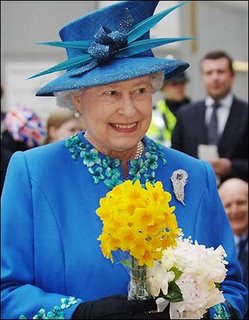 Happy 80th bitrthday to the Queen of England. As the head magistrate in the United Kingdom, the beloved queen also holds office in two very distinct churches.
Happy 80th bitrthday to the Queen of England. As the head magistrate in the United Kingdom, the beloved queen also holds office in two very distinct churches.As head of the Church of England, the Queen is the chief decision maker of this historic denomination. In theory, she presides over each decision that is made in the denomination.
In Scotland, the Queen, in theory, is present at each of the Church of Scotland's assemblies.
In England- prelate.
In Scotland- presbyterian.
Without giving the PRESBYTERIAN THOUGHTS position just yet, what are your thoughts on a magistrate being involved in the Church? American, no. Biblical, ?
6 comments:
I would tend to go with the results. It obviously hasn't helped out the Church of England.
I feel constrained to point out that the Queen has no official position in and no rights over the CoS, unlike the CoE. Much blood was spilled to achieve it. Shame that the CoS has since sold itself for a mess of liberal pottage.
For the official position see this.
Stephen. Thank you for saying just what I was going to say!
The Queen is NOT 'head' of the Church of England, she is its 'Supreme Governor'. In fact the Prime Minister (whether Jewish, Roman Catholic, Methodist or atheistic) makes key Church appointments.
Not that I am defending the CofE. I left it.
I'm with the old Scots Presbyterians here. The monarch is, at best, just a member of the Church. Jesus Christ alone is King of the Church.
Here is the WCF on the Magistrate. The Queen does hold a position:
The civil magistrate may not assume to himself the administration of the Word and sacraments, or the power of the keys of the kingdom of heaven: yet he hath authority, and it is his duty, to take order, that unity and peace be preserved in the Church, that the truth of God be kept pure and entire; that all blasphemies and heresies be suppressed; all corruptions and abuses in worship and discipline prevented or reformed; and all the ordinances of God duly settled, administered, and observed. For the better effecting whereof, he hath power to call synods, to be present at them, and to provide that whatsoever is transacted in them be according to the mind of God.
I am opposed to it because it does not allow the local church to have much athority.
But as you OUGHT to know (If you've read the hefty vol. that is represented in your official photograph, the Church of Scotland adopted a DECLARATORY ACT (gasp!) concerning that section of the Confession. I quote:
"It is further declared, That the Assembly understandeth some parts of the second article of the thirty-one chapter only of kirks not settled, or constituted in points of government..." (Act approving the Confession of Faith, General Assembly of the Church of Scotland, August 27th 1647 Pages 16 and 17 of the FPP edition of the WCF and other subordinate standards). THis rather modifies your quotation from Chapter 23. Since the Act Approving is as much law in the CofS as is the Confession, it inicates that, while the Magistrate is required by the Confession to uphold and defend the Church, the Church is not bound by him.
That is the Westminster Doctrine as I see it. Without necessarily agreeing with it.
Post a Comment